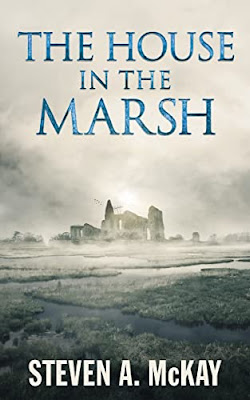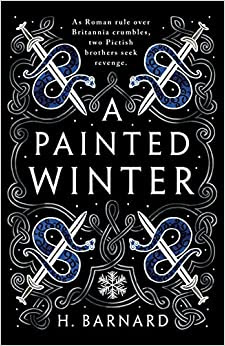The final thrilling tale of the House of Appius Julianus.
A new and deadly threat has emerged at the outskirts of the Roman Empire on the Danube, one that threatens to throw the entire region into chaos.
I'm pleased to welcome author Amanda Cockrell to
The Writing Desk:Tell us about your latest book
`My latest book is The Border Wolves which is the fourth and final volume in The Centurions series, thirty-five years after the first three, so it feels rather like a resurrection. The series was first published in the 80s and was supposed to run to four volumes but the publisher was bought by another house between books 3 and 4, and as often happens, the new house killed a lot of their existing projects. So when Canelo wanted to republish the old ones and have me finish the series, I was thrilled.
It was a complete joy to take Correus and Flavius, my two centurion brothers, to the ends of their careers in the way I had planned, by way of Domitian’s Dacian war. And I must say I give thanks for the internet daily, because one forgets a lot of research in three decades and regaining all that knowledge would have been daunting without it.
What is your preferred writing routine?
It has changed a lot over the years as my domestic and day job circumstances have changed. Currently I set aside Mondays and Wednesdays to write and no one is allowed to stick anything else on my schedule on those days, or interrupt me unless something is actually on fire. I am not a morning person and usually get up about 10 and sit around in bed reading email. I get to the keyboard around noon and write solidly until 5 or 6. I find that around 1500 words is what I can do in a day. That seems to be my capacity for good work. After that whatever comes along generally isn’t much good, and will have to be rewritten the next day anyway.
What advice do you have for aspiring writers?
Read widely, in your genre and out of it. Read critically to figure out how the authors you love are bringing it off.
Take a creative writing class if possible for the feedback and listen to what is said. You may discard most of the advice, but it will make you look closely at your own work. No one is their own best editor.
Pay some attention to what is popular just now but stay away from hot trends because by the time you have written your book and sent it off, no one will want vampires anymore.
Join a society of other writers in your genre if there is one. They tend to be wonderful places to make both friends and useful contacts, and are generally very supportive of new writers.
Realize that you are probably not going to make a living doing this, and that if you do, some compromises in what and how you write will be almost inevitable. If you can find a day job that allows you to have time to write, then grab it even if it makes less money than the one that keeps you working 80 hours a week.
What have you found to be the best way to raise awareness of your books?
That has always been a hard thing for me. I am not by nature a public sort of person and one really does have to be these days. The days when your publisher did all the promotion are long gone. I have found a social media presence to be practically required and am more active there than I would be otherwise. Before the pandemic I did readings and went to conferences and will start doing those again when I can. I will say that if you get fan mail from readers, respond instantly and generously. They talk to each other.
Tell us something unexpected you discovered during your research
I think the most research fun I have had recently was in researching Roman tourism. There was a huge tourism industry over most of the Roman Empire, particularly Greece, with inns, guides, and dubious relics for sale. Baiae on the Bay of Naples was a closer vacation destination, with the beachside villas and yachts of the wealthy, endless nightlife, much of it less than respectable, and daytime excursions to the beaches, boardwalks, elaborate baths, and food stalls selling snacks. A good deal of the Roman remains are underwater now, but Pompeii and Herculaneum offer a good look at what used to be. I used Baiae as the background for a chapter in The Border Wolves.
What was the hardest scene you remember writing?
I think probably the beginning of Barbarian Princess, the second book in The Centurions, where for the sake of the plot, I killed off someone who my hero loved and that I rather liked as well. I ordinarily don’t mind doing people in—I drowned someone horribly in a bog in my current book, but I didn’t like him anyway— but that one got to me.
What are you planning to write next?
My new book is the first in a three-book series called The Borderlands. The first book is Shadow of the Eagle and it’s set during Agricola’s campaign for Scotland, or rather for what would eventually become Scotland, and cuts between the Romans under Agricola and the Caledones of the highlands led by Calgacos. No one actually knows anything at all about Calgacos. He is only mentioned by name by Tacitus and it is suspected that Tacitus may have simply made him up in order to have someone to hang a good speech on. So I could make him any kind of man I wanted to, which is always fun. My Roman hero, Faustus, belongs to the II Legion Augusta and comes from a Gaulish farming family. His mother was a British slave who his father bought for a housekeeper and later freed and married and he finds himself drawn to the Britons sometimes more than is comfortable when he lands there with the army. My Roman protagonists are never actual historical figures but fictional inhabitants of their time because I am always more interested in what it was actually like to live then than in the political machinations of the Roman Empire.
Amanda Cockrell
# # #
About the Author
Amanda Cockrell grew up in Ojai, California, a wonderful place where one could ride one’s horse down Main Street and there was a hitching post outside the library. It was a bedroom town for Hollywood, full of writers and actors and directors, so there was always something going on, and famous people’s discarded trousers tended to end up in the local thrift shop. Her father was a screenwriter and her mother a screenwriter and novelist. Besides her Roman books, she is the author of three contemporary novels, two of them set in a fictional version of her beloved home town. She has a master’s degree in English and creative writing from Hollins University and is managing editor of that university’s literary journal, The Hollins Critic. She also had the privilege of teaching creative writing at Hollins for many years. She lives with her husband, Tony Neuron, and a substantial assortment of dogs and cats, in Roanoke, Virginia. Find out more at
https://www.amandacockrell.com/ and find Amanda on
Facebook and Twitter
@CockrellAmanda1



















